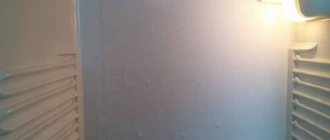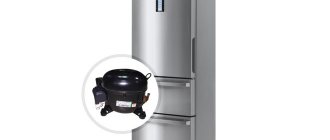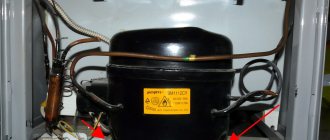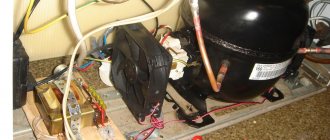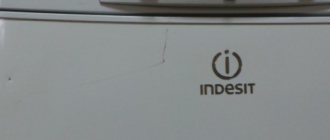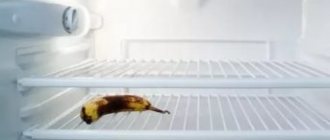What to do if your new refrigerator is noisy? Refrigerator noise requirements
Why it makes noise (the refrigerator hums) and what to do if there is gurgling in the refrigerator, the freezer is humming or the noise comes from the refrigerator with No Frost, we will tell you below, but for now we will give practical advice to those who are just about to buy a refrigerator.
When choosing equipment, pay attention to the information label (as a rule, it is easy to notice - it is located on the front of the unit). On this label, the manufacturer indicates not only the energy consumption class, but also the volumes of each chamber, and decibels are also written below. If peace in your home is important to you, then compare all the models that are presented in front of you and choose the one with the lowest noise level.
Premium refrigerators from Miele
When an old device began to cause inconvenience to the owner due to malfunctions during operation, or when furnishing a new home, household appliances were required, one cannot help but pay attention to the products of the premium brand Miele. Refrigerators of this brand have incredible reliability, low energy consumption class A+ (and higher). All structural elements of the refrigeration unit have an increased guaranteed service life, as they are made of materials and metals without impurities that reduce the cost and reduce the quality. According to statistics, out of a hundred calls to the service center for repairs, only one and a half percent are for products of this brand, and then with a service life of more than 10-15 years. Miele appliances have a unique design, developed for models of this particular brand, and have various solutions for built-in and free-standing installation.
Types of noise in the refrigerator:
All refrigerator noises are different and our customers complain about a wide variety of noises, we have selected the most common complaints:
- The fan in the refrigerator is noisy.
- Water is bubbling in the refrigerator.
- The refrigerator began to gurgle.
- The compressor hums, but does not work.
- There's a buzzing noise from behind the refrigerator.
- The refrigerator hums and rattles.
- The refrigerator makes a water sound.
- The refrigerator compartment is humming.
- The refrigerator makes a loud freon noise.
- Noise in the refrigerator.
- The sound of dripping water in the refrigerator.
- The evaporator in the refrigerator is noisy.
- The refrigerator is humming on the sides.
- The back wall of the refrigerator is noisy.
- Extraneous noise in the refrigerator compressor.
- The refrigerator makes noise like a blizzard.
- The refrigerator hums like a tractor (vacuum cleaner).
Also, sounds in the refrigerator may begin to appear after some process. Let's turn to our clients again and give examples of the most common cases:
- The refrigerator is noisy after transportation.
- The refrigerator is humming after defrosting.
- After rearranging the refrigerator began to hum.
- The refrigerator hums when the door closes/opens.
If you have chosen a very quiet refrigerator, but this does not prevent it from making a loud noise, then there are reasons that cannot be attributed to breakdowns, and you can solve the problem yourself.
1. Check for transit bolts. These elements are needed to fix the springs that secure the engine. If you inadvertently forgot to remove the bolts, the springs will not absorb shock and the refrigerator will operate very loudly.
2. If you don’t know why you can’t turn on the refrigerator immediately after transportation, then give it time - first let it stand turned off for a while, and after turning it on, let it go into optimal operating mode (sometimes this process takes a week, don’t demand too much from the unit and silent operation in the first hours and days).
3. Check whether the equipment is installed correctly. Perhaps the BHP comes into contact with a wall, furniture or other household appliances. To avoid resonance, there should always be a five-centimeter gap between the refrigerator and other surfaces, furniture and appliances.
Character of sound
To determine the causes of noise, you can focus on its nature. Listening to the hum of equipment, you can identify the following types of sounds:
- A hum or howl reminiscent of a blizzard. Refrigerators begin to howl due to the compressor running. The noise is complemented by vibration of the housing and other parts. When using two-compressor refrigerators such as Liebherr SBS 7252, the hum continues longer.
- A strange sound, reminiscent of gurgling or gurgling. Sometimes the equipment begins to hiss, hum or grunt - most often the sound is heard when the compressor is turned on. This is because the new refrigerants are noisier than the older brands R12 and R134a.
- Whistling. Refrigerators can whistle when the fan blades touch ice - a problem that arises if models without the No Frost mode are not defrosted for a long time.
- Buzz. The cause of the sound is a burnt-out evaporator heater in the freezer. Due to the formation of a large amount of ice, the engine begins to constantly buzz and rattle loudly.
- Clicks. The reason is the operation of temperature relays. Usually they are not paid attention to. But, if the refrigerator clicks more strongly, the equipment may indicate a problem, to eliminate which the relay is changed. The problem often occurs with Ariston Hotpoint brand products.
- Monotonous broadband noise. The cause is most likely the fan.
- A sound similar to ringing and rattling. The refrigerator may rattle or ring if not positioned correctly.
Important! Some refrigerators may crack if installed too close to walls or radiators. The problem can be solved for any refrigerator by moving it a sufficient distance from them. And owners of such inexpensive models as Stinol may encounter a slight crash due to the expansion and contraction of the plastic walls of the refrigerator compartment.
Let's look at breakdowns that can cause the refrigerator to make too much noise.
- The compressor is running and the refrigerator is noisy. Most likely, natural wear and tear of the compressor motor occurred during operation of the refrigerator. A breakdown of the unit provokes the formation of backlash in parts. The pistons or piston rings could be worn out. As a result, when the refrigerator is operating, very loud sounds reach your receptors. If the parts have already worn out significantly, then decompression of the motor may occur, so in addition to noise, you will observe prolonged operation of the compressor. You need to replace the motor.
- It hums when the compressor is running, the noise increases at the beginning and at the end of the engine operating cycle. The shock absorbers of the unit could be weakened, so the vibrations of the switched on motor will be heard more strongly. When starting and stopping the compressor, the sound becomes stronger as the unit jerks. The shock absorbers need to be adjusted.
- The sounds resemble grinding; the refrigerator has a No Frost function. If your refrigerator really works like a tractor and the noise sounds like grinding, then you may be hearing a fan noise in the freezer. Ice may form near the fan. If ice freezes around the fan in the freezer, then when it rotates, it touches the ice with its blades, so the noise resembles a squeak.
The refrigerator needs to be defrosted. And remember that complete defrosting of the refrigerator lasts at least 10 hours! If the ice freezes again after some time, this may indicate another breakdown. Be that as it may, the unit needs to be turned off, diagnosed and professionally repaired.
Other cases with “gurgling”, “clicking”, “blizzard”, etc. most often these are absolutely normal sounds for a running refrigerator. And the sound of refrigerant circulating in the system is not a malfunction at all - this murmur should not cause you concern. It’s another matter if the refrigerator was “silent” for a long time, and then took it and “talked.” In this case, it still wouldn’t hurt to call a good master for these complex negotiations.
Ask a Question
Ask your questions about repairing any household appliances or electronics. We have already been able to help 211,274 visitors to our site.
When the door is opened, warm air enters the chamber, and when the door is subsequently closed, this air is sharply cooled from the walls of the chamber and the stored products, decreases in volume, and the door of the refrigeration chamber is, as it were, sucked into the cabinet opening for some time. The sound you hear is more of air being sucked in than air being released. Check the drainage system (the system for removing melt water from the evaporator), perhaps it is through it that air is sucked into the refrigerating chamber.
Ask your questions about repairing any household appliances or electronics. We have already been able to help 211,274 visitors to our site.
Pipes touching other parts of the refrigerator
If the knocking sound when starting up and shutting down the unit is accompanied by a constant rattling sound, this indicates that the refrigerant piping is touching the frame or casing of the compressor. If the position of the tubes is not corrected in a timely manner, their prolonged friction against other parts will lead to the appearance of holes in them and leakage of freon. To eliminate the malfunction, you should carefully examine the position of the suction, discharge and capillary tubes in order to detect the point of contact. You can bend the tube with your own hands, but this must be done carefully, trying not to damage its integrity.
Location Features
If the refrigerator is noisy, evaluate its location and analyze the correct installation. Check whether the housing of the device is in contact with other household appliances, walls or furniture located nearby. Upon contact, characteristic sounds will inevitably occur due to the vibrations caused by the engine.
The solution is obvious: you need to move the refrigerator away from surrounding objects, maintaining a distance of at least 3-5 centimeters. Such gaps are necessary not only to minimize noise, but also to ensure smooth operation.
When your refrigerator is making a lot of noise, the compressor may be coming into contact with other parts. This is possible when installed on an uneven surface. If the floor is crooked, another situation is also likely: not all legs will be placed on the support; due to the reduction in the area of contact with the floor, the device will vibrate and, accordingly, make much more noise than it should.
Incorrect installation: the refrigerator is humming, what to do?
Oddly enough, but incorrect installation of the refrigerator can really interfere with its operation. And that's why it buzzed. But you should always check the horizontal and vertical position of the body of your equipment. Compressor noise often occurs due to misalignment. And sometimes, due to misalignment, one of the adjustable legs simply hangs in the air, and the lack of support affects the fact that the refrigerator begins to operate loudly, and unusual vibration occurs.
The refrigerator may be humming due to improper installation.
And how can you fix the problem? Everything can be quickly done with your own hands using a building level. If there is none, you can use a plumb line made of thread and a weight. Then check the points where the legs touch the floor. It happens that the floor is uneven, and the leg hanging in the air needs to be adjusted - that’s why there are threads on the legs.
Fan fault
If you own a modern refrigerator that operates according to the “no Frost” system, then it has a fan (in some models even two), which facilitates the timely evaporation of the condensate that forms. And the reason that the device began to hum may be precisely the breakdown of this part.
In most cases, noise occurs due to ice formed on the evaporators: with a thick layer of ice, the fan blades will come into contact with the ice and make knocking sounds. To solve the problem, you need to turn off the refrigerator and leave it for at least ten hours.
If, after defrosting and restarting, ice begins to form again, this may be a signal of various malfunctions: a door seal is broken, or the evaporator heating element is failing. In the first case, replace the seal; in the second, the heating element will need to be replaced.
What sounds can a refrigerator make?
The usual measured rumbling of the unit is perceived as the norm, and therefore is often not even recorded. However, some sounds are downright alarming in their unusualness. Let's consider which of them are a signal of a malfunction, and which are completely harmless.
Clicks
If you notice that the refrigerator is making strange clicks (they may not be loud, but muffled), then first check how the freezer functions. If the food in it seems to be defrosted, or there is fresh frost on it, you should immediately call a repairman.
Refrigerator malfunctions that cause clicking noises:
- Compressor motor failure. If this part overheats and the start-up relay is triggered, then after a series of loud clicks the compressor turns off and the refrigerator stops functioning. Checking the freezer will notice this almost immediately;
- breakdown of the start-protection relay. If clicks occur immediately after the light goes out in the refrigerator, then the relay will need to be replaced;
- unbalanced motor mount. In this case, the freezer will continue to operate and the light will not go out. However, the alarming clicks will not stop until the motor mount is adjusted.
Checking the functioning of the freezer allows you to quickly diagnose faults in the refrigerator motor. If everything is in order and the freezer is operating as usual, then most likely the problem is due to temperature changes. A constant draft or the oven being turned on can cause deformation of plastic parts, which is why clicks occur.
Gurgling, buzzing and gurgling
Sounds such as gurgling, slight hissing and the pouring of liquids are not a cause for concern. Of course, it’s worth checking to see if there is any liquid under the refrigerator, but almost always the gurgling sound just means freon flowing through the tubes.
Moreover, the new refrigerator will most likely murmur louder than the unit of the old model. This is due to the fact that modern refrigerators use isobutane (freon R600a) as a refrigerant. This substance flows at a higher speed, making the refrigerator more functional, but noisier.
But if the unit gurgles, gurgles and pretends to be a spring stream, but does not freeze, then this indicates a freon leak. You can't cope here without a master.
Most often, a leak occurs in places where the pipeline is factory soldered (locking joints), in the steel heating circuit of the freezer perimeter or in the refrigerator evaporator
Crackling
Cracking is most often caused by improper operation of the refrigerator. With increased frost formation, an ice crust begins to crack on the surface of the evaporator. Try defrosting the refrigerator, drying it naturally and plugging it back in.
By following the rules for storing products given in the operating instructions for the unit, you will thereby reduce frost accumulation and the associated cracking noise.
If you are famous for your neatness and monitor the condition of the equipment in the house, then perhaps the problem is the following malfunctions:
- thermostat failure;
- freon leak;
- blockage in the capillary pipeline;
- wear of the rubber seal (statistically, this reason causes increased ice formation in 90% of cases);
- freezing of thermal insulation;
- Solenoid valve malfunction.
All these breakdowns must be diagnosed and repaired by a refrigerator repairman. Without experience and the appropriate tools, you can only do this.
My old refrigerator lasted twenty years. During this time I changed the rubber seal three times. As soon as I began to notice that the freezer was not covered tightly, and ice formed in just a couple of weeks, I immediately called a technician. Repair work was very inexpensive, and the compressor became much easier to operate. And the sounds that the unit made immediately returned to normal. The crackling sound, reminiscent of a walk through a winter thicket, disappeared.
Buzzing
The humming sound is the most common warning sign of refrigerator problems. And here you must definitely keep in mind that the steps to find out the cause of the buzzing differ for new and old units.
The new refrigerator is humming
For most modern models, the upper limit of permissible sound intensity does not exceed 40 dB. If the hum is louder, then the reason may be as follows:
- The transport bolts have not been removed. These parts secure the springs to which the compressor is attached. You can remove them yourself without calling a specialist;
- incorrect installation. If the refrigerator does not have gaps with the furniture or wall, then the humming sounds will never stop. Check this point yourself, and calling the technician can be postponed for a long time;
- inaccurate loading of products. Even one glass jar pressed tightly against the wall of the refrigerator can cause a loud hum, let alone if the unit is filled with food and containers. In this case, it is also within your power to eliminate the cause of extraneous sounds;
- increase in humming intensity during and after switching on. There is no need to worry here either, this is a normal process of starting the refrigerator motor.
The old refrigerator is humming
The most common causes of humming from an old unit:
- wear of the motor-compressor. In this case, backlash of parts or decompression of the motor occurs. There is only one option - call a technician and change the compressor;
- faulty motor shock absorbers. Here you either completely change the compressor or adjust the shock absorbers. It’s also impossible to figure it out without a master;
- electric heater burnout. A serious breakdown that can only be diagnosed by an experienced technician. Requires replacement of several parts;
- violation of the condenser cooling mode. This happens due to improper placement of the refrigerator. If it is in a room with poor ventilation or close to a stove, then the compressor has to work hard. You can handle this yourself - just place the refrigerator away from radiators, stoves and other heat sources.
Grinding noise from refrigerators with No Frost system
Many owners of refrigerators with a No Frost system complain of a loud grinding noise. The reason for this is improper air circulation in the freezer and refrigerator compartments.
A refrigerator with a No Frost system is considered the noisiest model among refrigerators
These refrigerator models are equipped with fans, the lubricant of the bearings evaporates over time. As a result, ice forms on the evaporator, which is touched by the moving blades with an unpleasant grinding sound. Only a complete twelve-hour defrosting of the refrigerator and relubrication of the bearings will help here. I’m glad that you can do this yourself, without calling a specialist, and save the family budget.
When I bought a refrigerator with a No Frost system, I was not prepared for the fact that it would be noisier than its brother without fans. Over time, of course, everyone at home got used to take-offs and landings in our kitchen, but I regret that the consultant in the store did not warn me about the noise level that such models emit.
Incorrect or insufficient fixation of the compressor housing
When the refrigerator suddenly begins to make noise like a tractor, you need to check whether the electric motor housing is properly secured in place. During operation, it vibrates strongly, so due to poor fastening it will dangle, come into contact with surrounding parts and make loud sounds. If such a problem is detected, all fixing elements should be tightened well.
In older models, the compressor is located on springs, and when they stretch and wear, noise inevitably appears. Old parts need to be replaced. Sounds may also appear due to wear of the rubber gaskets located under the engine. If they are damaged or become unusable, only replacement will help.
If the device was purchased recently and was installed independently, the owner may have forgotten to remove the compressor transportation bolts. They are designed to protect the motor from damage when moving, but must be removed before installation. The master knows about this, but an inexperienced installer or ordinary user may not have such information. To solve the problem, unscrew the fixing elements, usually located on the sides of the compressor at the bottom.
Lack of air in the compressor
If your refrigerator makes noise like a transformer, it may be due to lack of air. If oxygen access is limited or difficult, the condenser will cool untimely and insufficiently, increasing the load placed on the compressor. And if the motor works hard to ensure proper cooling, all its component parts rub against each other more actively, making noise. The problem can also cause ice to form on the capacitor, which will increase the sounds produced by the device.
Pipeline clogged
If the refrigerator makes loud and unpleasant noises after closing the door, then why is this happening? The cause may be a clogged pipeline, and most often the filter and throttle are affected. Blockages cause a decrease in cooling intensity, which increases the load on the compressor and causes noise. What to do in this situation? It is difficult to clear the blockage yourself, so it is better to trust a professional.
Video: Refrigerator hums and rattles - a simple solution.
Electrical circuit malfunctions
What is the reason for the noise the refrigerator makes when the compressor and fan are fine? Perhaps the whole point is a malfunction of the electrical circuits. There may be several breakdowns:
- If the refrigerator hums loudly and suddenly turns off, most likely the start protection relay has broken down. In this case, the part needs to be replaced, and only an experienced repair technician can carry it out. And even when the light is on in the chamber, this is not a guarantee that the relay is in order.
- The motor windings burned out and the resistance changed. To determine this for sure, you can take a measurement with a multimeter. In any case, the motor needs to be changed, although sometimes thoroughly drying it is effective. If there is no effect, call a specialist for replacement.
- Compressor overheating. If it heats up too much and quickly and becomes very hot, and not warm as it should be, then it works intensely, amplifying the sounds it makes. Most likely, the engine has failed due to wear, in which case it will inevitably need to be replaced. But you can try turning off the device, letting it “rest”, and then turning it on again. When the refrigerator continues to operate in the same noisy mode and, moreover, does not start, the compressor definitely cannot be restored.
Crackling sounds from refrigerators of different brands
The most common brands of refrigerators in everyday life - Atlant, Indesit, Ariston, Samsung - are compressor devices. The causes of noise listed above apply to them fully. The most common serious cause of rattling noise from these devices is a broken thermostat. Such a malfunction can be repaired efficiently by a technician from the service center.
In the simplest case - the refrigerator is in the wrong position or there is poor contact in the plug, a man who has the skill to work with his hands can easily cope with the appearance of a crackling noise when operating a refrigerator of the listed brands. If there are symptoms of a more serious breakdown, you should contact a warranty workshop.
Refrigerant
When the refrigerator makes noise constantly, but not very loudly, the reason for this may be the refrigerant rapidly circulating through the pipes. The rapid movement of freon is accompanied by sounds, and this is normal.
But if the noise is loud and occurs after calling a technician and refueling, then the problem could arise due to an increase in the volume of refrigerant. The pressure in the tubes will increase, causing noise. In this case, contact a specialist again so that he can remove excess freon and fix the problem.
Refrigerator type
There are also noises that are characteristic of the breakdown of refrigerators of a certain type. Strange creaking and grinding noises can be observed in many modern models with the No Frost system, which are often found among the brand's products. Such noises indicate a malfunction of the fan. They solve the problem by defrosting the equipment and calling a technician.
Owners of built-in refrigerators Ariston Hotpoint and other brands are faced with loud noise immediately after installation. This happens due to the fact that the equipment becomes too close to other surfaces - walls and shelves. Even effective sound insulation does not always help get rid of noise.

